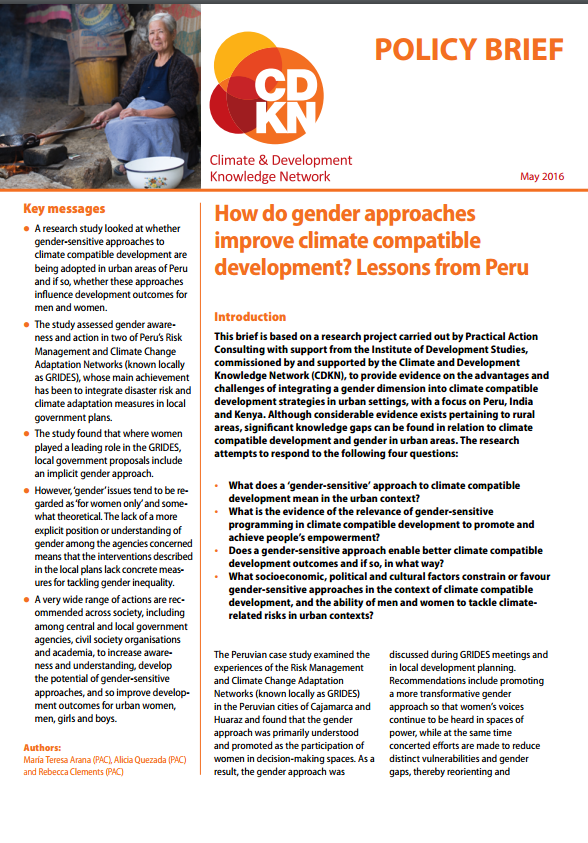Policy brief: How do gender approaches contribute to climate compatible development? Lessons from Peru

Introduction
This brief* is based on a research project carried out by Practical Action Consulting with support from the Institute of Development Studies, commissioned by and supported by the Climate and Development Knowledge Network (CDKN), to provide evidence on the advantages and challenges of integrating a gender dimension into climate compatible development strategies in urban settings, with a focus on Peru, India and Kenya. Although considerable evidence exists pertaining to rural areas, significant knowledge gaps can be found in relation to climate compatible development and gender in urban areas.
The research attempts to respond to the following four questions:
- What does a ‘gender-sensitive’ approach to climate compatible development mean in the urban context?
- What is the evidence of the relevance of gender-sensitive programming in climate compatible development to promote and achieve people’s empowerment?
- Does a gender-sensitive approach enable better climate compatible development outcomes and if so, in what way?
- What socioeconomic, political and cultural factors constrain or favour gender-sensitive approaches in the context of climate compatible development, and the ability of men and women to tackle climate related risks in urban contexts?
The Peruvian case study examined the experiences of the Risk Management and Climate Change Adaptation Networks (known locally as GRIDES) in the Peruvian cities of Cajamarca and Huaraz and found that the gender approach was primarily understood and promoted as the participation of women in decision-making spaces. As a result, the gender approach was discussed during GRIDES meetings and in local development planning.
Recommendations (see full text for details) include promoting a more transformative gender approach so that women’s voices continue to be heard in spaces of power, while at the same time concerted efforts are made to reduce distinct vulnerabilities and gender gaps, thereby reorienting and strengthening development processes. The findings presented in this brief are based on interviews and focus group discussions held with key informants, as well as a review of relevant literature, policy documents and plans.
*download from the right-hand column or via the link under further resources
Key Messages
- A research study looked at whether gender-sensitive approaches to climate compatible development are being adopted in urban areas of Peru and if so, whether these approaches influence development outcomes for men and women.
- The study assessed gender awareness and action in two of Peru’s Risk Management and Climate Change Adaptation Networks (known locally as GRIDES), whose main achievement has been to integrate disaster risk and climate adaptation measures in local government plans.
- The study found that where women played a leading role in the GRIDES, local government proposals include an implicit gender approach.
- However, ‘gender’ issues tend to be regarded as ‘for women only’ and are somewhat theoretical. The lack of a more explicit position or understanding of gender among the agencies concerned means that the interventions described in the local plans lack concrete measures for tackling gender inequality.
- A very wide range of actions are recommended across society, including among central and local government agencies, civil society organisations and academia, to increase awareness and understanding, develop the potential of gender-sensitive approaches, and so improve development outcomes for urban women, men, girls and boys. [see the full text for details of the recommendations made]
Authors: María Teresa Arana (PAC), Alicia Quezada (PAC) and Rebecca Clements (PAC)
About CDKN
The Climate and Development Knowledge Network (CDKN) aims to help decisionmakers in developing countries design and deliver climate compatible development. We do this by providing demand-led research and technical assistance, and channeling the best available knowledge on climate change and development to support policy processes at the country level.
About Practical Action Consulting
Practical Action Consulting (PAC) is the consulting arm of Practical Action, an international development agency working with poor communities in Africa, Asia and Latin America to help them choose and use technology to improve their lives.
Suggested Citation
Arana, M. T., Quezada, A. and Clements, R. (2016) How do gender approaches improve climate compatible development? Lessons from Peru. CDKN Policy Brief. Climate & Development Knowledge Network: London, UK
Related resources
- Read the full policy brief
- Policy brief: How do gender approaches contribute to climate compatible development? Lessons from Kenya
- Policy brief: How do gender approaches improve climate compatible development? Lessons from India
- 10 things to know: Gender equality and achieving climate goals
- Gender approaches in climate compatible development: Lessons from urban India
- Read the online book: Mainstreaming climate compatible development
(0) Comments
There is no content